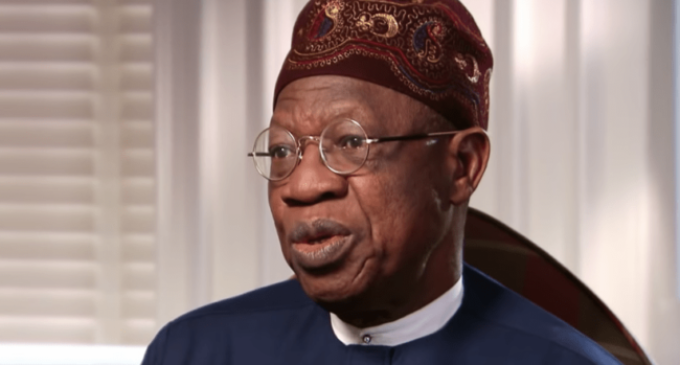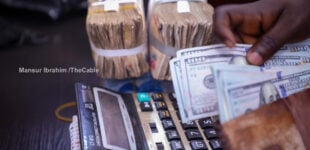What exactly is Lai Mohammed saying?

More than once this week, the usual grandstanding of Lai Mohammed, Nigeria’s information minister, has played in my mind with depressing effects. How can a country be so blessed and unlucky at the same time?
On Tuesday, Nigerians woke to reports that about one hundred congregants were kidnapped at the Emmanuel Baptist Church, Kakau Daji, Kaduna state last Sunday. Their sin was that they were Nigerians who chose to go to church and worship God in a country where life now goes for a penny. One person reportedly died in the incident. That same morning, news broke that six people, including two professors and members of a family, were taken away by bandits from the staff quarters of the University of Abuja. According to reports, that facility is a mere 45 kilometres from the city centre and near a military formation.
The Abuja incident gives a two-fold instruction. One is that these terrorists are moving in and confidently close to the federal capital territory (an alarm that had been sounded by Abubakar Sani Bello, the governor of Niger state). The second is that the military is so stretched that the capacity to respond to the hydra-headed dimension of Nigeria’s security challenges is near non-existent. These hoodlums reportedly operated for over one hour before making away with their captives, but no help came. That tells how well this country can protect her people!
Yet, for this exact point, Mohammed took on the London, United Kingdom-based The Economist, last week. In a press conference held in Abuja on Thursday, the minister was at his livid best. His grouse was not just against the foreign magazine but also the Nigerian media, which to his audacious mind, was not sensible enough to decipher what report it should amplify. Mohammed’s main beef was that the magazine wrote that the jihadist threat in the north-east had “metastasised” and its assertion that “jihadists are carving out a caliphate in the north-east…”
To impugn the magazine’s proposition, the minister embarked on needless air beating. He told stories about what he did in 2015, forgetting that effective governance is not about what the government claims to be doing but what the people can see and feel. While it is true that we have no reports of jihadist caliphates, we know Babagana Zulum, Borno state governor, has, in the past one year, thrice escaped death only by providence and the grit of security agents attached to him. The last event was last Sunday when a reported attack on his convoy was said to have forced him to cut short a trip to Malam Fatori. Reuters claimed that three military and a security source confirmed the story. No one has denied the report!
However, let’s assume that last Sunday’s report is speculative; when Zulum’s convoy was attacked last November, nine members of his convoy did not live to tell the story! The governor himself came out of the incident undignified and ruffled, yet Mohammed and his cohorts say nothing there’s to worry about! But Nigerians do not even need a physical caliphate to understand that they are under
siege. When “bandits” infiltrate and penetrate prime institutions like the Nigerian Defence Academy, killing two officers and taking a major away for 24 days, that nation can’t be far away from the kind of trouble that The Economist described. The situation is even more manifest when this military officer was said to have only been released after the payment of ransom put together by his colleagues! Again, we got no denial of that report.
In the same Kaduna state, four students at Bethel Baptist College have spent more than 120 days in the captivity of those whom the Nigerian government insist are bandits, despite their terrorist activities and appeals by Nasir El-Rufai to declare them as terrorists. The four students are part of 121 students kidnapped from the school by these criminals on July 5. Parents of the 117 already released paid ransoms to get their wards back.
Before then, these criminals kidnapped staff and students at Greenfield University in Kaduna, killing five of them before their eventual release. Before then, monies totalling about N150m were paid while motorcycles, foodstuff, and all sorts of other items were
demanded and delivered without fail for the release of the captives!
Earlier this year, Sani Bello, the governor of Niger state, said Boko Haram terrorists had hoisted their flag in Kaure village in the Shiroro local government area of the state. He also said their fighters had forcefully taken over the wives of villagers and allocated them to themselves. Just a week or so back, there was this viral video of a customs officer speaking about how they had to hand over several bags of rice and become friends with bandits to preserve their lives. In Sokoto state, levies are being taken from communities with ultimatums attached! There is no end to the atrociousness of the daily stories about Nigeria’s perilous security situation.
However, Mohammed and his friends sit on high horses, imagining that this is about their egos and the reputation of the government they serve. In their opinions, they serve the president and not the people of Nigeria on whose benevolence he was elected in the first instance. Nigerians have become foot mats in the contemplation of today’s government men. Suppose we assume that The Economist, or whatever interest they represent, has a dog in the Nigerian fight. Would an investigation of the claims in that article and getting to rectify whatever pitfalls are discovered not do more for the country than this pathetic victim complex that these men exhibit? It is like the man who, after being beaten with a heavy rod six times, says none of the strokes hit the target. Would anyone bear the pain with him when reality knocks at night? That is where those who deny that all is not well with Nigeria are leading the country. Mohammed indeed had the nerve to draw a parallel between bandits imposing levies and area boys terrorising people across Nigeria! Like any of these was not an eyesore, which a minister in the 21st century should too be shamefaced to even mutter in public. But these men are too taken by their own continued relevance.
However, shouldn’t the welfare of Nigerians be a priority over the triumphalist shenanigans the minister displayed last week as almost always? But leadership, the Nigerian way, is more about puffery and blame-shifting than it is about people. If it weren’t, the minister would find it more desirable to reassure and give Nigerians hope rather than tackle and play pun with the Nigerian media’s ability to fulfil its watchdog calling.
Something about Nigerian leaders and their penchant for self-glorification always reminds me of the myth of Nero who was said to have fiddled away while Rome burned. The story goes that Nero, who was emperor in Rome between 64 and 68 A.D., loved to play a musical instrument. Although there is no agreement on whether the instrument he liked was the fiddle or some other instrument, his love for music is not in dispute. Nero loved music to the extent that he would sometimes abandon his charge to embark on musical expeditions.
According to one account, while on one of such adventures, the great fire that consumed Rome in A.D.64 started and ravaged the city. At the end of the six-day fire, it destroyed 70 per cent of the city, with half of the population rendered homeless and hopeless. Nero’s subjects believed that he either set the fire himself or ordered it especially as he began to rebuild the city in a much grander way than it was before the fire. Faced with this credibility question, Nero embarked on a search for scapegoats. He found his sacrificial lambs in some Christians who he vigorously persecuted, tortured and executed. None of this, however, lifted the burden of the fire from Nero’s shoulders. In A.D. 68, there was a rebellion against him from which he committed suicide.
Nigeria is in a flurry of widespread anarchy for which the state seems helpless. It is a disheartening replay of Rome being on fire and Nero frolicking as leaders are currently at their usual games of jumping parties and charging at people carrying out their legitimate duties instead of facing the issues and doing well by the people. The bitterness and arrogance of privilege are so much that valuable counsel like: “better policing could let the army withdraw from areas where it is pouring fuel on secessionist fires,” offered by The Economist in that piece escaped the minister’s notice. Our leaders forget that the ultimate intervener known as posterity, for which everyone should plant a good tree, today.
Twitter@niranadedokun
Views expressed by contributors are strictly personal and not of TheCable.


















There are no comments at the moment, do you want to add one?
Write a comment